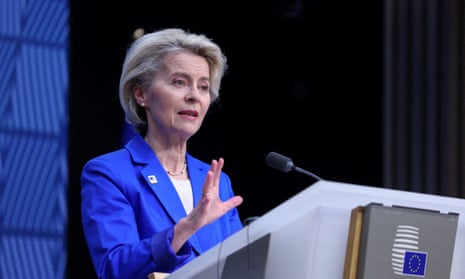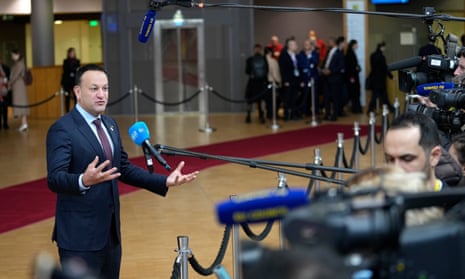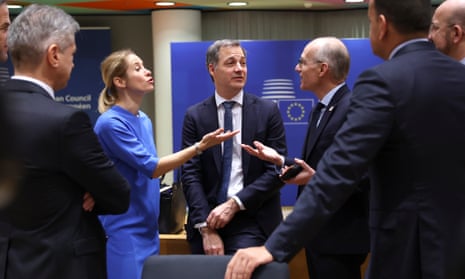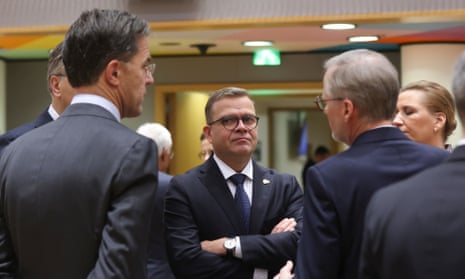Macron confident Orbán can be persuaded to support funding for Kyiv

Lisa O’Carroll
The Hungarian prime minister, Viktor Orbán, told European leaders he will not block negotiations on Ukraine’s accession to the EU if Kyiv meets the remaining reforms it has been asked to undertake by next March, the French president, Emmanuel Macron, has said.
“If these rules are met, and I asked him the question, he told me that he would not block, if that were the case. If the seven rules are met, then you will need to be able to open discussions,” Macron told reporters.
He said he was also confident that Orbán would be persuaded in the new year to come on board with the financial aid package for Ukraine, as his decision to block it meant he also blocked fresh funds for his own country, his neighbours and for migration border controls.
Key events
Asked about how the bloc plans to get Hungary on board with giving Ukraine extra funding, European Council Charles Michel quipped: “it’s a very good question!”
He added:
We are determined to use all the possible arguments, and we’ll engage – with respect … and we know that getting a united decision is always challenging, but this is an important decision that we need to make.
And I think the debate that we had yesterday was also an occasion maybe to better understand what could be some tools, what could be some arguments that we will use in the days, in the weeks to come to prepare the next European Council meeting.
Asked about Hungary’s remaining frozen funding, the European Commission president, Ursula von der Leyen, said:
The moment there is a delivery of the necessary reforms, there is a disbursement.
Addressing the issue of the proposed €50bn package for Ukraine, which Hungary is now blocking, she said:
We are working very hard, of course, to have a result where there is an agreement of 27 member states.
But I think it is now also necessary to work on potential alternatives, to have an operational solution in case that an agreement by 27 – so, unanimity – is not possible.
Macron confident Orbán can be persuaded to support funding for Kyiv

Lisa O’Carroll
The Hungarian prime minister, Viktor Orbán, told European leaders he will not block negotiations on Ukraine’s accession to the EU if Kyiv meets the remaining reforms it has been asked to undertake by next March, the French president, Emmanuel Macron, has said.
“If these rules are met, and I asked him the question, he told me that he would not block, if that were the case. If the seven rules are met, then you will need to be able to open discussions,” Macron told reporters.
He said he was also confident that Orbán would be persuaded in the new year to come on board with the financial aid package for Ukraine, as his decision to block it meant he also blocked fresh funds for his own country, his neighbours and for migration border controls.
Commission to ensure ‘operational solution’ on budget after Orbán blocked Ukraine aid, von der Leyen says
The European Commission president, Ursula von der Leyen, said in a press conference after the leaders’ summit that “yesterday’s decisions show that the European Union is living up to its promise”.
In a world that is shaken by multiple crises, it’s an investment in stability, it’s an investment in security of our continent, but of course it’s also an investment in prosperity for our continent, and it’s a big investment in democracies that stand tall and united.
Speaking about the proposed revision of the EU budget, von der Leyen noted that the current long-term budget, which runs from 2021 until 2027, was designed before the current crises facing Europe.
The first priority is Ukraine, followed by migration, boosting competitiveness and addressing natural disasters and humanitarian crisis, she said.
She noted that 26 countries agreed on the proposal on the table. “This is a good result,” she said, adding that tough choices were required.
Addressing Hungary’s lack of support for the budget, von der Leyen said the Commission will use the time until the next summit “to ensure that whatever happens at this next [European Council], we will have an operational solution.”

Ireland says EU money will ‘continue to flow’ to Ukraine despite Orbán decision to block aid package

Lisa O’Carroll
Leo Varadkar, the prime minister of Ireland, said funding “will continue to flow” to Ukraine despite the decision by Viktor Orbán to block a decision to approve a €50bn aid package for the next four years.
It’s not a disaster in the sense that we can now roll over the loans to Ukraine. The money will continue to flow to Ukraine for the next couple of months. And hopefully when we come back here in January or February we’ll be able to agree a package of financial support for Ukraine.
On the Middle East, he said there was no a “clear majority” for a ceasefire in but they had agreed at this point not to draw up conclusions or a declaration and they would return to the subject in the new year.
I think if we’d tried to have written conclusions we would have been here for many, many hours. And probably have only come up with compromise wording that nobody would have been happy with.
But I think it is very clear that there was a very good discussion, a strategic discussion on the Middle East.
The room has changed since we last discussed this back in October.
There is now a very clear majority in the European Union for humanitarian ceasefire for an end to the conflict.

Charles Michel also addressed the leaders’ discussion on the situation in the Middle East.
The European Union needs to be committed and involved, as far as possible, in trying to have an impact in what is happening.
He added:
There is strong unity around the guarantee of security for Israel. Israel has the right to its security, it has the right to exist. And that’s why on repeated occasions we have continued to condemn Hamas’s terrorist attacks and the choice of Hamas to use civilians as human shields.
We urge and call upon Hamas to release unconditionally the remaining hostages – immediately.
And we also repeat that the right to defend itself in Israel has to be carried out in compliance with international law.
And we reiterate again also that humanitarian support and aid must be guaranteed.
Among some of the members of the European Council, there are different feelings and sentiments about the idea of a pause, a humanitarian pause, supported by others, and a humanitarian ceasefire, supported by others.
But the essential points, I think, are linked to two points: joint commitment to further support and offer support on humanitarian aid, and to ensure that humanitarian access for aid is open … Another essential point is not just to reiterate the traditional standpoint of the EU, but its commitment to the political process for a two-state solution.
And that means that the European Union countries have to work in an accelerated way to build upon this … Some people said that we should, quite rightly, condemn the increasing attacks led by settlers against Palestinians in the West Bank.
The leaders also talked about the “next day”, he noted.
Michel ‘confident’ EU will support Kyiv financially
Speaking at a press conference after the EU leaders’ summit, European Council president, Charles Michel, said Russia’s war has already transformed the bloc and that this week’s summit had a historic dimension given the decision to open accession talks with Ukraine and Moldova.
We are absolutely convinced that enlargement is investment in peace, in security, and in prosperity. This is a very powerful political message that we send to our European citizens and that we send to the citizens of the candidate countries and to the rest of the world.
He also noted that 26 member states out of the 27 supported a proposed budget revision and that a special summit will be held next year to try to bring everyone on board.
The proposal on the table is “very well balanced,” he said, noting that it shows the commitment to support Ukraine, and takes into account priorities such as migration and defence.
I’m extremely confident and optimistic that we’ll be in a position to fulfil on our promises to support Ukraine with financial means.

At the end of the summit, Latvia’s Evika Siliņa took an optimistic tone.
European Council results: a historic decision to start EU accession negotiations with Ukraine and Moldova.
We will continue to seek solutions for long-term EU financial support for Ukraine. We return to the EU leaders’ table early next year – and we will deliver!

José Manuel Fernandes, a Portuguese MEP who is the centre-right European People’s party spokesperson for budgets, has criticised the Hungarian prime minister, Viktor Orbán.
In a statement, he said:
Hungary’s veto must be condemned for what it is: a cynical move for selfish political interests.
Prime minister Orbán should be ashamed of his actions – blocking aid to Ukraine which is defending European democracy on the battlefield every day. This approach cannot be tolerated at EU level. We don’t tolerate any type of blackmail.
Summit ends
The European Council summit has officially ended, an EU official said.
Stay tuned for details from the closing press conference.
Leaders move on to migration
The EU’s leaders have now started discussing migration.
The EU’s 27 leaders “had a strategic debate” on the Middle East that they will “continue to discuss in the future”, said an EU official, noting that a text on the topic was not tabled.
Hungarian officials are enjoying the attention in Brussels.
EU position on Gaza moving, says Varadkar

Lisa O’Carroll
European leaders are unlikely to call for a ceasefire in the conflict in the Middle East but may harden the language of the declaration the European Council made in October when it called for pauses or pauses in the bombing of Gaza, said the Irish prime minister, Leo Varadkar.
Foreign policy matters are done on the basis of consensus or unanimity. The majority of EU countries are now calling for a ceasefire, that’s very clear from the UN vote the other day, but there are one or two who are not because they believe that it would prevent Israel from pursuing Hamas terrorists.
I don’t agree with that interpretation. You can pursue terrorists without engaging in the kind of war and destruction that Israel is engaging in at the moment.
He added:
I am not sure we can get agreement on the use of the word ceasefire. But I do think we’ll see the European Union’s position move on considerably from where it was in October. We now have a clear majority of countries here in the European Union calling for a ceasefire.
He also said there was also likely to be “strong language on human rights” and violence by some Israeli settlers West Bank.


Lisa O’Carroll
EU leaders are expected to issue fresh statements on the Middle East, the rise of antisemitism and the question of sanctions against Israeli settlers involved in violence in the West Bank this afternoon.
First on the agenda is the Middle East.
Diplomats said it was “important that leaders were allowed to speak” on the issue but, unlike the last summit meeting in October, they were not looking to make a common declaration, thereby averting a repeat of five-hour debate on whether there should be “pause” or “pauses” in the bombing of Gaza.
To follow on the agenda are discussions about security and defence, migration and the strategic priorities for the EU, including the improving relations with Turkey.
After a long night, leaders are meeting again.
Here are some photos.





